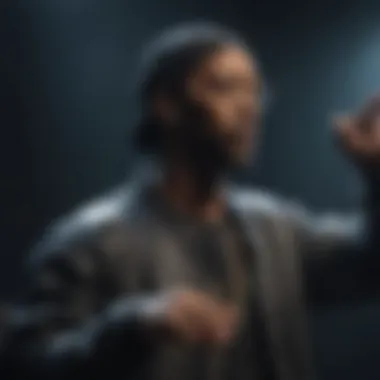The Evolution and Legacy of RZA in Music


Intro
RZA, one of the most prominent figures in hip-hop, is not just a name; it symbolizes an extensive journey through music, film, and culture. His rise from the streets of Brooklyn to global acclaim is a testament to his unyielding passion and unorthodox vision. RZA's contribution to the music industry goes beyond mere entertainment; it has woven itself deeply into the fabric of contemporary culture. This is a story of artistic evolution, innovation, and influence.
Artist Profile
Biography and Background
Born Robert Fitzgerald Diggs on July 5, 1969, in Brownsville, Brooklyn, RZA's early life was anything but typical. Growing up in a neighborhood that faced systemic challenges, his surroundings played a pivotal role in shaping his artistry. He discovered his love for music at a young age, largely influenced by his family's background and the urban culture that surrounded him. His formative years were marked by struggles, yet they fueled a fires of creativity.
In the early 1990s, RZA's vision began materializing. He founded the Wu-Tang Clan, a collective of talented artists which would later redefine hip-hop. The clan, an ensemble of unique voices, boasted a rich tapestry of lyrical depth and raw energy, establishing a new standard for group dynamics within the genre. RZA emerged as both a leader and a mastermind behind the group's sound, showcasing his pioneering production style that was both hard-hitting and innovative.
Major Influences and Inspirations
RZA's musical journey is rich with influences, drawing from various genres and cultures. The eclectic mix contributes to his unique sound, which draws heavily from:
- Martial Arts Films: RZA often cites classic kung fu movies as a significant inspiration, incorporating their dialogue and themes into his music.
- Philosophy: His interest in Eastern philosophy, particularly the teachings of the Five Percent Nation, deeply informs his lyrical content and worldview.
- Soul and Jazz: These genres heavily influence his production style, with sampled beats that evoke emotional depth.
- Hip-Hop Pioneers: Early influences, from legends like Public Enemy to Run-D.M.C., laid the groundwork for his understanding of rhythm, beats, and lyrical ingenuity.
RZA’s ability to intertwine these elements into his music not only showcases his versatility but also establishes his place as a creative innovator.
Song Analysis
Theme and Lyrics Breakdown
RZA's lyricism is laden with metaphor and complexity. He often encapsulates themes of struggle, spirituality, and resilience. For instance, in the track “C.R.E.A.M.”, he poignantly addresses the harsh realities of street life, emphasizing the grit and rawness of his experiences while making it universally relatable. The refrain resonates with listeners as it exposes the truths behind the hustle and the quest for survival.
Instrumentation and Composition
The instrumentation in RZA's work is notable for its distinctive use of samples and beats. His productions often utilize:
- Dissonant Samples: Incorporating obscure samples from various genres, giving the music a layered quality.
- Dynamic Basslines: Deep, rumbling bass that drives the energy of the tracks.
- Layered Vocal Interplay: Featuring various members of Wu-Tang, adds richness and depth to the narrative.
RZA’s approach to composition reflects a meticulous craftsmanship that can be both haunting and empowering. Through his innovative methods, he continually pushes the boundaries of hip-hop.
"RZA's music is like a tapestry; every thread tells a part of the story, interwoven with influences that defy genre."
RZA's evolution as an artist showcases his relentless pursuit of growth and creative exploration, marking him as not only an influential figure in hip-hop but also a cultural icon whose legacy transcends the confines of music.
Prologue to RZA
The significance of this section lies in its exploration of Robert Fitzgerald Diggs, better known by his stage name RZA. As the architect behind the Wu-Tang Clan and a multifaceted artist beyond the realm of hip-hop, RZA embodies a unique convergence of talent and visionary prowess. In the following subsections, we will unpack the layers of his birth, upbringing, and early influences that shaped his perspective and artistry.
Understanding RZA’s roots provides a vital context for appreciating his craft and the profound impact he has had not only on music but also on broader cultural narratives. His life story charts a course through the complexities of urban life in New York City and showcases the transformative power of music as a medium for expression and connection.
Birth and Early Life
RZA was born on July 5, 1969, in Brooklyn, New York, into a family with deep musical connections. His father, a musician, harbored hopes that his son would follow in his footsteps, yet the reality of life in the projects introduced RZA to a different landscape. Early on, he found home in the rough streets of Brownsville, an experience that would later echo in his lyrical themes. Living in a neighborhood often marked by violence and struggle, RZA learned how critical it was to navigate life's challenges.
As a child, he also spent time in the nearby Staten Island, which would come to influence Wu-Tang's identity. This duality of environment fostered in him a rich tapestry of cultural experiences that permeated his music. RZA's exposure to various influences—hip-hop, martial arts films, and philosophy—would later serve as his playbook for creativity.
Initial Musical Influences
Many artists cite their inspirations, but for RZA, it's more like a recipe, blending diverse genres and styles into something completely unique. In his youth, he was surrounded by the burgeoning hip-hop scene of the late 1970s and early 1980s, where names like Grandmaster Flash and Run-DMC resonated like gospel. Furthermore, jazz and rock snippets from his father's vinyl collection added depth to his understanding of rhythm and melody.
Adopting the name RZA, he melded these sounds with elements from classic Kung Fu films, which inspired not only his musical themes but also his persona. It's crucial to note that his fascination with the martial arts was not merely for aesthetics. Besides the imagery, the principles of discipline and the concept of the warrior's journey resonated deeply with him, influencing how he approached his craft.
"Musical talent is an extension of life experiences, and my initial musical influences were the pivotal moments that shaped my path."
RZA’s early years brought the simultaneous exposure to music's joys and the harsh realities of life. This convergence went on to lay the foundation for something truly groundbreaking—music that speaks to the soul, punctuated with the wisdom garnered from a life rich in experiences.
Formation of Wu-Tang Clan
The formation of Wu-Tang Clan marked a revolution in hip-hop, blending distinct personalities, styles, and artistry into a cohesive musical force. This collective reshaped not just the genre, but also the approach towards collaboration and independent artistry that would influence artists for years to come. The importance of this formation cannot be overstated; it represents a pivotal moment where individual talents converged into a powerhouse that challenged the status quo.
The Concept and Formation


In the early 1990s, RZA, along with a group of friends from Staten Island, envisioned creating a group that would later be known as Wu-Tang Clan. The concept was unique: instead of simply assembling a band of rappers, they aimed to create a musical family that emphasized both collaboration and independence. Each member had their own solo aspirations, yet they knew that united they could achieve more. This duality gave rise to the idea that being part of Wu-Tang Clan didn’t mean sacrificing individual artistry; rather, it enriched the whole.
The group's name, inspired by martial arts films, embodied this philosophy. They were more than just musicians; they were a collective fighting against the homogenization of the music industry. RZA was central in naming the group and forming its identity through various symbols and imagery drawn from Shaolin culture.
Moreover, the decision to incorporate a strong visual identity connected to martial arts gave the group a distinctive edge. Wearing matching clothing and adopting alter egos helped solidify their brand.
The Wu-Tang logo, featuring a stylized letter 'W,' became iconic, representing resilience and unity—a stark contrast to the prevailing focus on individualism in hip-hop.
RZA’s Leadership Role
RZA's role within Wu-Tang Clan cannot be understated. As the primary producer and visionary, he was the architect behind the group's sound. He brought a unique production style that fused samples from eclectic sources, including film scores, soul records, and even obscure vinyl, creating a sonic tapestry that was both innovative and compelling. His ability to weave different genres into hip-hop defined their sound, making it rich and layered.
RZA not only shaped the musical direction but also acted as a guiding force for the members of the group. His experience and foresight helped navigate the tumultuous waters of the music business. RZA understood that they needed to foster individual careers while maintaining the integrity of the group. This balance translated into separate solo albums that could draw from the strength of their collective reputation while exploring personal themes.
"Musicians often think in solo terms; RZA’s brilliance was acknowledging the power of community. In his view, collaboration was the best way to carve a path in an increasingly competitive industry."
Under RZA's leadership, each member found their distinct voice while still contributing to the overall vision of Wu-Tang Clan. He instilled a sense of discipline and purpose that drove the group toward unprecedented success. His leadership style—rooted in mutual respect and shared goals—was crucial in establishing Wu-Tang Clan as a force to be reckoned with in the music world, setting the stage for their enduring legacy.
Musical Style and Innovation
RZA's signature sound is the heart and soul of what makes him a titan in the world of hip-hop. His musical style is not just a collection of beats and rhythms but rather a unique amalgamation of various influences that reshape the landscape of contemporary music. This section shall explore the intricate details behind his production techniques and the lyrical themes prevalent in his works, which together create a tapestry of sound that resonates with fans and musicians alike.
Production Techniques
RZA's production techniques are a hallmark of his artistry. He is known for his innovative use of samples, drawing from an eclectic mix of genres including soul, jazz, and even classical music. This sampling approach gives his tracks a distinct texture, bridging the gap between different musical worlds. For instance, on the iconic album "Enter the Wu-Tang (36 Chambers)", tracks like "C.R.E.A.M." showcase how a simple piano loop can redefine a genre.
In addition, RZA's mastering of the gritty, lo-fi sound has become a defining characteristic of his style. Many producers lean towards polished clarity, but RZA embraces a rough edge that adds authenticity and raw emotion to his work. The layered sounds in tracks are often underpinned by minimalist drums, which maintain a relentless forward momentum while allowing the lyrical content to shine.
Key Production Elements:
- Sampling Diversity: RZA's vast range in sampling fuels creativity. He has tapped into old kung-fu movie soundbytes, blending them into the fabric of his music.
- Layering: The use of multiple layered sounds creates depth in his instrumentals, which can feel both spacious and intimate.
- Beat Structure: RZA often employs irregular time signatures, pushing the boundaries of conventional hip-hop rhythms.
With all these aspects combined, RZA does more than produce music; he crafts experiences that challenge listeners to engage on multiple levels.
Lyrical Themes
The lyrical themes in RZA's work reflect a profound complexity, interweaving personal experiences with broader cultural commentary. He often incorporates elements of philosophy, morality, and the struggle for identity, influenced heavily by his interests in Eastern philosophy and spirituality. Tracks like "Liquid Swords" not only showcase lyrical prowess but also evoke vivid imagery that transports listeners into a world of street narratives, martial arts, and wisdom.
RZA’s lyrics are characterized by a conversational tone that juxtaposes everyday struggles with philosophical musings. This blending of the mundane and the profound allows listeners to find personal relevance in his words. His lyrics tackle love, betrayal, and the pursuit of knowledge, encouraging the audience to think critically about their reality.
Common Lyrical Themes:
- Struggle and Survival: Many songs focus on the trials of street life, reflecting resilience and a will to overcome.
- Philosophy and Spirituality: RZA often explores higher ideals, longing for truth and enlightenment amidst chaos.
- Cultural Commentary: His work frequently engages broader societal issues, making powerful statements about race, class, and identity.
RZA’s ability to intertwine sound and message makes his work not only musically significant, but philosophically relevant, leaving an indelible mark on the landscape of hip-hop.
"The goal is to stay in constant motion, pushing the limits of creativity and questioning the foundations of what music can be."
Through RZA, we see how musical style and innovation forge new paths in art, setting a precedent for future generations of musicians.
Major Albums and Tracks
The body of work crafted by RZA not only reflects a unique artistic vision but also serves as a significant marker in hip-hop's chronology. His major albums and tracks offer insights into his evolution as an artist, showcasing how he deftly fused personal experience with broader cultural commentary. This section sheds light on essential albums that have become touchstones in music history, revealing not just their sonic innovations but also their lyrical depth and social relevance.
Enter the Wu-Tang ( Chambers)
Released in 1993, Enter the Wu-Tang (36 Chambers) is often hailed as a milestone in hip-hop. This debut album shattered norms and introduced a new paradigm of style and storytelling in rap. RZA's production on this album was quite revolutionary, employing a mix of gritty beats, cinematic samples, and an eclectic array of vocal deliveries. The collaborative synergy created by Wu-Tang members added layers to the project, with each member showcasing their individuality under RZA's guidance.
Several tracks from 36 Chambers became instant classics, but what truly sets this album apart is its unfiltered reflection of street life intertwined with martial arts and Eastern philosophies. Songs like *
RZA as a Producer
RZA's acclaim as a producer is a vital element of his artistic footprint. His ability to blend genres, create distinct sounds, and cultivate talent has not only shaped the Wu-Tang Clan's discography but has also left a significant mark on the broader hip-hop landscape. Engaging with the concept of production in RZA's world means delving into how he revolutionized the genre and set a standard that many still aspire to today.
Collaboration with Wu-Tang Members


The synergy within Wu-Tang Clan can be likened to a well-oiled machine. RZA, often seen at the helm, was the driving force behind the group's production. His collaborations with fellow members like GZA, Ghostface Killah, and Method Man illustrate a unique creative chemistry. For instance, on Liquid Swords, RZA provided GZA with intricate beats laced with samples from classics. This relationship was reciprocal; GZA's lyrical prowess added layers to RZA's already fascinating instrumentals.
The teamwork didn’t stop at albums alone. Individual songs often emerged from late-night sessions, where ideas would bounce around like a game of ping pong. Consider “C.R.E.A.M.”, which showcases RZA’s knack for storytelling through beats. It’s not just about the music; it’s about the atmosphere he crafted where artists felt empowered to express their truths. This collaboration fostered a unique identity for each member within the group while showcasing RZA's versatility.
Notable Outside Collaborations
RZA’s influence extends beyond just his Wu-Tang siblings. His collaborations with a variety of artists in different genres reveal an adventurous spirit and inclination to push boundaries. Working with artists like Kanye West, he produced tracks that integrated hip-hop with elements of soul and R&B. Notably, his work on Kanye's "Dark Fantasy" is a testament to how his style transcends genres and continues to resonate across generations.
Another memorable collaboration includes “My First Song” with Jay-Z, where RZA's signature beats paired seamlessly with Jay’s lyrical insight. This partnership highlighted his ability to adapt his production style to suit varying artists while still maintaining his core sound.
"RZA's genius lies not just in his beats but in his ability to elevate others. Every collaboration is like stitching a quilt where each patch tells a part of the story."
RZA's work stretches far beyond traditional production roles. He’s mentored countless artists, shaping new talent while never hesitating to dive headfirst into creative endeavors with a diverse cast of musicians. Whether weaving through the underground scenes or collaborating with mainstream giants, his production ethos remains consistent—a blending of authenticity, ingenuity, and respect for the art form.
In this vast labyrinth of collaboration, RZA continues to generate sounds that resonate, proving that a true producer is a maestro who knows how to select the right notes while allowing each artist to shine in their own right. The legacy he’s building is not just a collection of tracks; it’s a testament to the power of collaboration and the influence of a visionary.
Transition to Film and Television
RZA's move from the music scene to the realms of film and television signifies more than just a career shift; it marks a pivotal expansion of his artistic expression. His transition illustrates the versatility of creative talent, showcasing his ability not only to craft beats and lyrics but also to weave narratives and build visual worlds. This section delves into two major aspects of this transition: his endeavors as a director and his forays into film scoring. Each element reveals layers of RZA's artistic persona while providing insight into how his musical roots inform his cinematic endeavors.
Directorial Ventures
As a director, RZA approached filmmaking with the same innovation he brought to his music. He directed his first feature film, The Man with the Iron Fists, in 2012, which blended martial arts with urban culture, a signature amalgamation that fans of the Wu-Tang Clan would recognize. This film not only served as a love letter to kung fu cinema, but also reflected his unique ability to marry sound and image, creating a visceral experience for the audience.
RZA's directorial style is characterized by his keen understanding of rhythm and pacing, which mirrors the same principles he applies to music production. He often collaborates closely with cinematographers and editors, ensuring that the visual storytelling maintains the same intensity and energy that his music exhibits. His keen eye for detail can be seen in the way he choreographs fight scenes, demanding a certain tempo that enhances the viewing experience. Each shot feels as if it's plucked from a musical score, revealing how intertwined his musical sensibility is with storytelling.
Moreover, through his directorial ventures, RZA has explored themes of loyalty, betrayal, and identity. The narratives he constructs often echo the lyrical content found in his music, providing fans of the Wu-Tang Clan a deeper understanding of his artistic vision. In a way, his films serve as a continuation of the stories he shares through his lyrics, allowing him to explore different dimensions of the same themes.
Film Scoring
RZA's prowess as a film scorer further extends his influence into the cinematic world. He has composed music for various films that resonated with audiences well beyond his core fanbase. For instance, his score for Ghost Dog: The Way of the Samurai not only featured haunting melodies but also incorporated hip-hop elements that tied into the film’s themes of honor and isolation. This blend creates a unique auditory landscape that is both engaging and evocative, effectively translating the film's emotional currents.
In films like The Man with the Iron Fists and others, his scores are characterized by a rich tapestry of sounds, reflecting his diverse musical background. He skillfully integrates traditional instrumentation with modern sounds, crafting a sonic experience that enhances the visual narrative.
RZA’s musical compositions in film illustrate his understanding of mood and atmosphere, often employing dissonance and resonance in a way that keeps the audience on the edge of their seats. His commitment to authenticity means that even the music meticulously aligns with the cultural and emotional themes portrayed on screen.
"Music in film is not just a backdrop; it's an essential character that drives the story forward," RZA once stated, highlighting his belief in the power of sound to shape narratives.
As RZA continues to navigate this expansive territory, he not only reinforces his legacy within hip-hop but also carves a niche as an auteur filmmaker and composer. This transition illustrates the broader potential of artists who refuse to be boxed into a single genre, proving that creativity knows no bounds.
Philosophical Influences and Beliefs
RZA's artistic journey is not only marked by musical evolution but also deeply intertwined with his philosophical beliefs. This section delves into how these influences shape his work and overall artistry. By weaving philosophy into his music, RZA provides listeners with a multidimensional experience that goes beyond rhythmic soundscapes and catchy lyrics. The importance of philosophy in RZA’s career speaks volumes about the power of ideas in art. Understanding this aspect enhances our grasp of his contributions.
Incorporation of Eastern Philosophy
RZA’s fascination with Eastern philosophy, particularly Buddhism and Taoism, manifests prominently in his lyrics and overall artistic direction. He often integrates concepts such as balance, humility, and the interconnectedness of life into his work. This philosophical foundation offers a stark contrast to the hyper-individualism often celebrated in Western music.
Key Aspects:
- Mindfulness: RZA emphasizes mindfulness, encouraging listeners to reflect on their lives and decisions.
- Duality: The idea of yin and yang can be seen in his music, often highlighting conflicts and resolutions within individuals.
- Impermanence: A recurring theme in his lyrics touches upon the transient nature of life, which is crucial in many Eastern philosophies.
"The universe is all about balance. You can’t see the light without seeing the dark." – RZA
These principles not only guide RZA's personal life but also inspire his audience to think more critically about their circumstances and environment.
Personal Philosophy in Music
RZA's personal philosophy extends beyond the philosophical texts he's studied. It involves a conscious approach to creativity, collaboration, and community ethics. His views reflect an expansive understanding of how music and culture intersect with individual and collective identities.
- Unity through Collaboration:
- Authenticity:
- Creation as a Spiritual Practice:
- RZA believes in the collective spirit. His role in the Wu-Tang Clan serves as a prime example. Each member brings a unique voice, yet they work together to create something larger than themselves.
- At the core of RZA's philosophy is the notion of being true to oneself. He often encourages others to express their reality, regardless of its alignment with mainstream expectations.


- Creating music is akin to a meditative practice for him. The act of producing sound becomes a way to express feelings, question existence, and connect with the divine.
RZA’s Influence on Modern Hip-Hop
RZA's fingerprints are unmistakably etched into the landscape of modern hip-hop. His contributions to the genre extend far beyond just production or lyrical prowess. He has sculpted a sound and approach that continues to resonate with contemporary artists. This section explores specific elements that showcase RZA's monumental influence, the benefits of his innovative methods, and a broader contemplation of his place in music history.
Impact on Contemporary Artists
RZA's impact on contemporary artists is nothing short of remarkable. Many rising stars have cited him as a primary influence in their musical careers. For instance, artists like Kendrick Lamar and J. Cole have drawn inspiration from RZA’s complex layering of sound and storytelling. RZA's unique blend of gritty, street-level narratives paired with cinematic soundscapes provides a framework that many modern musicians emulate.
One could argue that he has unlocked the doors to creativity, offering a path that inspires artists to infuse personal experiences into their work, oftentimes with deep philosophical undercurrents reminiscent of RZA's own themes. His collaborative spirit has led to numerous partnerships, helping emerging talents craft their sounds while also maintaining a distinctly Wu-Tang essence.
- Kendrick Lamar: Known for his dense lyricism, Lamar employs intricate narratives, echoing RZA's storytelling.
- Joey Bada$$: This Brooklyn artist has credited RZA for pushing him towards a more authentic, raw approach.
Artists today are also embracing the DIY mentality that RZA exemplified. The rise of home studios and independent labels can be traced back to the creative autonomy he championed within the Wu-Tang Clan. This shift has granted many artists the freedom to experiment without the constraints often imposed by major record labels.
Revival of Classic Techniques
RZA's contributions have initiated a revival of classic techniques in hip-hop production. In an era where digital beats have dominated, RZA's penchant for sampling has encouraged many producers to return to vinyl records and live instrumentation. His intricate use of samples from diverse genres—ranging from martial arts scores to soul classics—sets a precedent that modern-day producers often seek to recreate.
This revival can be seen in the works of artists who have drawn from RZA's playbook:
- Logic: Known for his samples that harken back to earlier periods in hip-hop.
- Denzel Curry: His lyrical intensity and choice in beats reflect that nostalgic essence.
The prevailing trend of blending samples with live instrumentation and innovative sound design has roused a fresh appreciation for older styles. Many producers today craft their tracks purposefully with flaws and imperfections to capture the raw energy embodied in classic recordings, honoring RZA's approach.
"RZA taught us that hip-hop is not just a genre but a living art, echoing stories and emotions. It’s a tapestry woven with our history, dreams, and struggles."
In essence, RZA's influence on modern hip-hop is vast and multi-layered. He has inspired contemporaries to push boundaries and embrace their roots while paving the way for future generations of artists. This dual legacy of innovation and tradition has ensured that his essence continues to shape the genre in profound ways, making him one of the defining figures of this musical revolution.
Legacy and Cultural Significance
The legacy of RZA stretches far beyond his significant contributions to hip-hop and music production; it encapsulates a whole era that reshaped how art is perceived and created. His journey reflects an evolution marked by creativity, innovation, and an understanding of cultural contexts. From the chaotic streets of Staten Island to becoming a symbol of artistic vision, RZA serves as a bridge between generations of artists, influencing the landscape of hip-hop while leaving an indelible mark on popular culture.
His impact can be dissected into several identifiable threads: critical recognition, cross-industry collaborations, and an exploration of philosophical ideas that resonates deeply with audiences. Each of these threads plays a role in solidifying RZA's position as a cultural icon.
Recognition and Awards
RZA's body of work has not gone unnoticed in the realm of awards and accolades. From prestigious awards like the Grammy for Best Rap Album, which Wu-Tang Clan received, to honors in various music festivals, his contributions have earned him widespread acknowledgment. This recognition speaks volumes about his artistic prowess. Let’s explore a few notable recognitions:
- Grammys: Not limited to Wu-Tang, RZA’s individual projects have also garnered nominations, testifying to his talent across the board.
- MTV Video Music Awards: The clan’s music videos, often backed by RZA’s distinctive sound and vision, have regularly been in the spotlight.
- Award Shows: Various award shows continue to dedicate categories recognizing his influence as a producer and artist.
RZA's ability to fuse various musical elements has set a new standard in the industry, making him a frequent topic of conversation in artistic circles.
Cultural Impact beyond Music
RZA's artistic legacy is rich with influences that extend well into visual arts, literature, and philosophy. His multifaceted talents have led him to become a respected figure in film and literature.
- Film and Television: Beyond music, RZA has directed movies and created soundtracks that reflect his unique aesthetic. His work in films like "Ghost Dog: The Way of the Samurai" illustrates his penchant for blending music with narrative.
- Philosophical Contributions: The way he integrates elements of Eastern philosophy and martial arts into music adds another layer to his art. His reflections on life resonate with a diverse audience, promoting deeper conversations about culture and identity.
- Fashion Influence: RZA's style, often recognized for its unique and eclectic clothing choices, transcends music and has created trends in fashion seen on the streets and high-art platforms alike.
By engaging with these various aspects, RZA has crafted a legacy characterized by cultural significance that invites future artists to explore their identities within the ever-evolving tapestry of music and art.
The End
The culmination of RZA's artistic journey is a testament to not just his musical genius, but also to the broader cultural shifts he has influenced. In summarizing RZA's contributions, it becomes evident that he is much more than a mere figure in hip-hop; he is a revolutionary artist whose works resonate at multiple levels.
Summation of RZA's Contributions
RZA��’s footprints in the music landscape are undeniable. His narrative weaves together various threads of hip-hop, martial arts philosophy, and Eastern spirituality, creating a rich tapestry of sound and thought.
- Innovative Production: RZA reinvented the sound of hip-hop with his unique use of sampling and layered soundscapes. His method of piecing together samples from classic soul and obscure soundtracks has set a benchmark in music production.
- Leadership and Collaboration: As the head of Wu-Tang Clan, RZA has been the architect of a collaborative spirit, blending the talents of individual artists to realize a collective vision. This not only elevated their music but also fostered a sense of community in hip-hop.
- Crossover Influence: His ventures into film and television have opened doors for hip-hop artists, demonstrating that the creativity within the genre extends far beyond traditional musical boundaries.
- Cultural Commentary: RZA’s lyrics often serve as a reflection on social issues, personal struggles, and the journey of self-discovery. This deep connection to real-life experiences provides a layer of authenticity that resonates with listeners on a personal level.
Overall, RZA has carved a legacy that is not easily replicated. His artistic evolution reflects a commitment to innovation and authenticity that continues to inspire new generations.
Future Directions and Influence
Looking ahead, RZA's influence is poised to expand into even more diverse arenas. As the landscape of music and entertainment shifts, several key elements may shape his future contributions:
- Emerging Technology in Music: With the rise of artificial intelligence and virtual reality in music production and performance, RZA may harness these advances to innovate in ways we have yet to witness.
- Global Collaborations: As hip-hop transcends cultural boundaries, RZA’s potential collaborations with international artists could lead to fresh sound synthesis and broaden the genre's appeal.
- Mentorship: Given his wealth of experience, RZA may take on a more active role in nurturing young talent, fostering a new generation of musicians imbued with his values of creativity and cultural consciousness.
- Philosophical Endeavors: His integration of philosophy in music could evolve into wider discussions in public forums or academic settings, elevating the discourse around hip-hop as a serious art form.
In this ever-changing world, RZA stands not only as a participant but also as a pioneer. His future endeavors will undoubtedly keep advancing hip-hop and leave an indelible mark on culture.







